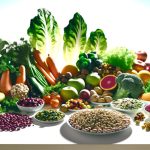Pre-workout nutrition is a critical aspect of an athlete’s regimen, often determining the effectiveness of a training session or performance in competition. It provides the necessary fuel for the body’s energy demands during exercise, supporting endurance, strength, and overall performance. The right balance of nutrients can also minimize muscle damage and facilitate recovery, making it an essential factor for both immediate and long-term athletic success.
Understanding the Body’s Energy Demands During Exercise
During exercise, the body relies on stored energy sources to maintain performance. Carbohydrates are the primary fuel for short and high-intensity activities, stored as glycogen in the muscles and liver. As glycogen stores deplete, exercise intensity can diminish. Proteins play a role in muscle repair and growth, while fats are utilized during longer, moderate-to-low intensity workouts. Understanding these energy dynamics is crucial for tailoring pre-workout nutrition to the type of exercise being performed.
Goals of Pre-Workout Nutrition
The primary objectives of pre-workout nutrition are to optimize glycogen stores, ensure adequate hydration, and provide the necessary amino acids for muscle preservation and repair. Achieving these goals helps maximize performance, delay the onset of fatigue, and accelerate recovery post-exercise. Athletes aim to consume a balanced meal of carbohydrates, proteins, and fats to meet these needs, with the timing and proportion of each macronutrient tailored to individual and workout-specific requirements.
Common Myths and Misconceptions
There are several myths surrounding pre-workout nutrition that can lead to confusion and suboptimal performance. One common misconception is that fasting before exercise will enhance fat loss; however, this can compromise energy levels and increase the risk of muscle loss. Another is that protein intake immediately before a workout is essential for muscle building, but it’s the total daily protein intake and its distribution that are more critical. Debunking these myths is vital for athletes to make informed decisions about their pre-workout meals.
The Science of Timing: When to Eat Before Exercise
Digestion and Absorption Timelines
Understanding the body’s digestion and absorption timelines is crucial for optimizing pre-workout nutrition. Generally, it takes about 2-4 hours for the stomach to empty after a meal, with carbohydrates being digested faster than proteins and fats. To avoid discomfort and maximize energy availability, it’s recommended to consume a balanced meal containing carbohydrates and moderate protein 2-4 hours before exercise. For those who prefer a closer mealtime to their workout, a smaller, carbohydrate-rich snack 30-60 minutes prior can provide a quick energy boost without the risk of gastrointestinal issues.
The Role of Glycogen Stores
Glycogen, the stored form of glucose in the liver and muscles, is the body’s primary energy source during moderate to high-intensity exercise. Adequate pre-workout nutrition ensures that glycogen stores are optimized, which is essential for sustained performance, especially in endurance sports. Consuming carbohydrates before exercise helps maintain blood glucose levels and delays glycogen depletion, thereby extending endurance and preventing early fatigue.
Ideal Timing for Different Types of Workouts
The ideal timing for pre-workout meals can vary depending on the type of exercise. For endurance workouts lasting over an hour, a larger meal rich in carbohydrates 3-4 hours before is beneficial. For strength training or shorter, high-intensity workouts, a smaller meal or snack 1-2 hours prior, focusing on easy-to-digest carbohydrates and some protein, can provide the necessary fuel without causing discomfort.
Adjusting Timing for Individual Needs
Individual needs and responses to pre-workout meals can vary widely. Factors such as metabolism, workout intensity, duration, and personal digestive comfort should guide meal timing and composition. Athletes should experiment with different timings and food choices to determine what works best for their body. It’s also important to consider hydration status, as even mild dehydration can significantly impair performance. Listening to the body’s hunger and fullness cues, as well as noting how different foods and timings affect energy levels and workout quality, will help tailor pre-workout nutrition for peak performance.
Macronutrients for Peak Performance
Carbohydrates: Fueling the Engine
Carbohydrates are the primary source of energy for athletes, serving as the fuel required by muscles to perform at the highest level. They are stored in the body as glycogen, which muscles use during both short, high-intensity workouts and longer endurance events. The key is to consume the right types of carbohydrates at the right times. Complex carbohydrates, such as whole grains, fruits, and vegetables, provide a sustained energy release, while simple sugars can lead to quick spikes and subsequent crashes in blood sugar levels. Timing your carbohydrate intake for pre-workout can involve consuming a meal with complex carbohydrates 2-3 hours before exercise or a smaller, carb-rich snack closer to your training session.
Proteins: Building and Repairing Muscle
Proteins are crucial for the growth, repair, and recovery of muscle tissues. While not the primary energy source during workouts, proteins provide the amino acids necessary to rebuild muscle fibers that are damaged during intense physical activity. Including a moderate amount of protein in your pre-workout meal can help prime your muscles for the stress they will undergo and support recovery processes post-exercise. Good sources of protein include lean meats, dairy products, eggs, and plant-based options like legumes and soy.
Fats: The Underestimated Fuel Source
Fats are often misunderstood in the context of athletic performance. While it’s true that they are less efficient as a source of immediate energy, they play a vital role in supporting prolonged exercise. Healthy fats, such as those found in avocados, nuts, seeds, and olive oil, should be included in your diet to help fuel longer-duration activities. They also aid in the absorption of fat-soluble vitamins and provide essential fatty acids necessary for overall health. However, due to their slow digestion, fats should be consumed in moderation and well before a workout to avoid gastrointestinal discomfort.
Balancing Macronutrients for Your Workout
The optimal balance of macronutrients for pre-workout nutrition can vary based on the individual’s goals, the type of exercise, and its duration and intensity. Generally, a pre-workout meal should be high in carbohydrates, moderate in protein, and low in fat. This combination helps ensure that you have enough energy to sustain your workout and protein to protect and repair muscle tissue without feeling sluggish. It’s important to experiment with different macronutrient ratios to find what works best for your body and performance needs. Remember to consider the timing of your meals, as this can significantly affect how your body utilizes these nutrients.
Choosing the Right Pre-Workout Foods
Whole Food vs. Processed Options
When selecting pre-workout foods, it’s essential to differentiate between whole and processed options. Whole foods are minimally processed and closer to their natural state, providing a rich source of nutrients, fiber, and sustained energy. Examples include fruits, vegetables, whole grains, nuts, and seeds. In contrast, processed options often contain added sugars, preservatives, and refined ingredients that can lead to a quick spike in energy followed by a crash. While convenience is a factor, aiming for whole foods can offer better nutritional value and longer-lasting fuel for your workout.
Organic and Vegan-Friendly Food Choices
For those who prefer organic or plant-based diets, there are numerous pre-workout options. Organic foods are grown without synthetic pesticides and fertilizers, potentially reducing exposure to harmful substances. Vegan-friendly choices, such as a smoothie with plant-based protein powder, oatmeal with almond milk and berries, or a quinoa salad with mixed vegetables, provide clean energy while aligning with ethical and dietary preferences.
Hydration: The Role of Fluids Pre-Workout
Hydration plays a critical role in pre-workout nutrition. Adequate fluid intake is necessary for optimal physiological function and performance. Water is the best choice for hydration, but for longer or more intense workouts, beverages containing electrolytes can help maintain fluid balance. Aim to drink water consistently throughout the day and have a hydrating drink about 30 minutes before starting your exercise.
Examples of Pre-Workout Meals and Snacks
- 2-3 hours before exercise: A sandwich on whole-grain bread with lean protein and a side salad.
- Within 2 hours: A protein smoothie made with milk, protein powder, and mixed berries.
- 45-60 minutes prior: A banana or a small granola bar for quick, digestible energy.
Remember, the timing and composition of your pre-workout meal can vary based on individual needs and the type of exercise planned. It’s important to listen to your body and adjust accordingly.
Special Considerations for Dietary Restrictions
Gluten-Free Pre-Workout Options
For individuals with celiac disease or gluten sensitivity, finding pre-workout meals and snacks that provide the necessary energy without causing discomfort is crucial. Gluten-free grains such as quinoa, buckwheat, and rice can serve as excellent bases for pre-workout meals. Combining these with lean proteins like chicken or fish and a serving of vegetables can offer a balanced meal to fuel exercise. Gluten-free oats are also a great option for a pre-workout breakfast, topped with fruits and nuts for added nutrients and energy.
Managing Pre-Workout Nutrition with Food Allergies
Food allergies can pose a significant challenge when planning pre-workout nutrition. It’s essential to identify safe foods that provide quick energy without triggering an allergic reaction. Simple carbohydrates such as fruits (e.g., bananas, oranges) are generally safe options. For protein, hypoallergenic sources like pea protein or rice protein can be used in shakes or smoothies. Always read labels carefully and consider consulting with a dietitian to create a personalized pre-workout nutrition plan that accommodates any food allergies.
Low FODMAP Foods for Sensitive Stomachs
Individuals with irritable bowel syndrome (IBS) or other digestive issues may benefit from low FODMAP pre-workout options. Foods like bananas, oranges, grapes, and spinach are low in fermentable carbohydrates and are less likely to cause gastrointestinal distress. Pairing these with a low FODMAP protein source, such as lactose-free yogurt or hard cheeses, can provide the necessary fuel for a workout without discomfort.
Pre-Workout Nutrition for the Plant-Based Athlete
Plant-based athletes can optimize their pre-workout nutrition by focusing on whole food sources of carbohydrates and plant proteins. A smoothie made with almond milk, a banana, a scoop of plant-based protein powder, and a handful of spinach provides a quick and easy pre-workout meal. Other options include whole-grain toast with almond butter or a small bowl of lentil soup. It’s important for plant-based athletes to ensure they’re getting enough protein and essential amino acids to support their training needs.
In conclusion, special dietary restrictions don’t have to hinder peak performance. With careful planning and consideration of individual needs, athletes can fuel their bodies effectively before a workout. Whether it’s gluten-free, allergy-friendly, low FODMAP, or plant-based nutrition, the key is to find what works best for you and provides the necessary energy to power through your training.
Supplements and Natural Alternatives
The Role of Supplements in Pre-Workout Nutrition
Supplements have become a staple in the fitness community, with many athletes and gym-goers turning to pre-workout formulas to enhance their performance. The primary role of these supplements is to provide an immediate and convenient source of energy and nutrients that can optimize physical output, delay fatigue, and improve concentration during exercise. Common ingredients like caffeine, creatine, branched-chain amino acids (BCAAs), and beta-alanine are included for their scientifically-backed benefits in boosting endurance, strength, and muscle synthesis.
Natural and Organic Supplements
For those seeking a more holistic approach, natural and organic pre-workout supplements are gaining popularity. These products often contain plant-based ingredients such as beetroot juice, known for its nitrate content that can improve blood flow, and green tea extract, which provides a gentler caffeine boost along with antioxidants. Organic supplements typically avoid artificial colors, flavors, and sweeteners, appealing to health-conscious consumers who are wary of synthetic additives.
Understanding Supplement Labels and Ingredients
Deciphering supplement labels is crucial for safe and effective use. Key information includes the serving size, ingredient list, and nutritional breakdown. Proprietary blends can be a red flag, as they may not disclose the amount of each ingredient, making it difficult to assess potency and safety. It’s essential to look for third-party testing certifications like NSF or Informed-Choice, which indicate that the product has been independently verified for quality and purity.
The Debate: Synthetic vs. Natural Supplements
The synthetic versus natural supplement debate centers on the source and processing of ingredients. Synthetic supplements contain lab-created nutrients, which are identical on a molecular level to their natural counterparts but can be produced at a lower cost and with greater stability. Natural supplements source nutrients directly from whole foods and are often preferred for their perceived purity and the presence of additional beneficial compounds. However, the efficacy and bioavailability of synthetic nutrients are generally comparable to natural ones, leaving the choice largely to personal preference and values.
In conclusion, pre-workout supplements can be a powerful tool for enhancing exercise performance, but it’s important to choose products that align with your health goals and dietary preferences. Whether opting for synthetic or natural formulations, always prioritize quality and transparency to ensure you’re fueling your body safely and effectively.
Conclusion: Integrating Pre-Workout Nutrition into Your Lifestyle
Creating a Sustainable Pre-Workout Routine
Establishing a sustainable pre-workout nutrition routine is essential for long-term success and peak performance. Begin by identifying foods that energize your body without causing discomfort during exercise. Consistency is key; aim to consume your pre-workout meal around the same time before training to establish a habit. Remember, this routine should be flexible enough to adjust based on your training intensity and personal schedule.
Listening to Your Body’s Signals
Every athlete’s body responds differently to various foods and timings. Pay close attention to how your body reacts to your pre-workout meals. If you experience any gastrointestinal upset or lack of energy, consider adjusting the composition or timing of your meal. Your body’s feedback is a powerful tool for optimizing your pre-workout nutrition strategy.
Continual Learning and Adaptation
Nutrition science is ever-evolving, and staying informed about the latest research can provide you with an edge. Attend workshops, read up-to-date literature, and consider consulting with a sports nutritionist to refine your approach. As your training demands change, be prepared to adapt your nutrition plan accordingly.
Final Tips for Peak Performance
- Plan Ahead: Prepare your pre-workout meals in advance to avoid skipping or rushing your nutrition.
- Balance is Crucial: Ensure your pre-workout meals include a good balance of carbohydrates, proteins, and fats to fuel your body effectively.
- Hydration Matters: Adequate fluid intake before exercising is just as important as the food you eat. Aim for at least 500 ml of water 2-3 hours before your workout.
- Experiment: Don’t be afraid to try new foods and timings to discover what works best for you.
- Monitor Progress: Keep a nutrition diary to track the effects of different pre-workout meals on your performance.
By integrating these practices into your lifestyle, you can ensure that your pre-workout nutrition is not only a catalyst for peak performance but also a sustainable and enjoyable aspect of your training regimen.
READ MORE: Pre-Workout Supplements Are They Effective?
Sources:
https://www.prevention.com/fitness/a20457971/pre-workout-snacks/?utm_source=google&utm_medium=cpc&utm_campaign=mgu_ga_pre_d_bm_prog_org_us_a20457971&gad_source=1&gclid=Cj0KCQiA_9u5BhCUARIsABbMSPt880olTu24rwYwLJGWYOcTY8ZYNmk4yneVUbB-ryh1sCLjkwR2ZPsaAiYoEALw_wcB
https://blog.nasm.org/what-to-eat-before-a-workout
https://www.mayoclinic.org/healthy-lifestyle/fitness/in-depth/exercise/art-20045506









